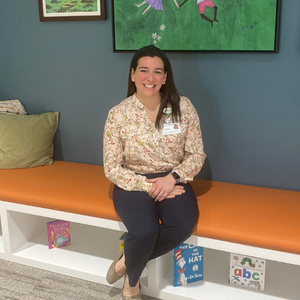Child Life Month: What Do Hospice Child Life Specialists Do?

Child Life Specialist Gilchrist Kids
March is Child Life Month, a time to celebrate the important work of child life professionals. Child life is an important component of Gilchrist’s work with patients and families. Children process experiences much differently than adults, and child life specialists are uniquely attuned to children’s social and emotional needs.
At Gilchrist, our Gilchrist Kids team incorporates child life into our hospice care. Child life specialists work with children to help them sort out their feelings, most often through play and imagination. Child life professionals also work with siblings and other young family members impacted by a child’s illness and impending death.
In honor of Child Life Month, we are spotlighting the work of child life at Gilchrist. Below, child life specialist Kyra Georgas, CCLS, shares her experience of helping our youngest patients and family members.
How Child Life Specialists Help Kids
Serious illness or the death of a loved one are upsetting for everyone involved, but children are particularly vulnerable. As a child life specialist, I work with our littlest patients to foster a safe, comfortable and healing environment. Often, therapeutic play is the most effective intervention to help a child sort out their feelings. After all, play is a child’s most genuine form of self-expression and communication. Play can also help a child process emotions while becoming familiar with the unknown. Through play, I show the child respect by communicating with them in their own language.
Therapeutic play can look like art, playing board games, or even typical dinosaur or doll play. Not only do children communicate through play, but they use their play as a way to express their feelings and fears while working through new or unresolved situations and experiences. Play is an essential building block of normal development in children. Play works not only as an intervention but also as an assessment tool.
Using Play to Talk About Feelings
Take a simple game of Jenga, which is appropriate for any age. This game can be modified to include questions on each block. One block may ask a child’s favorite color, while the next block may prompt a child to share a fear or stressor. Integrating therapeutic tools with play allows for a less threatening way for a child to share their inner thoughts.
Jenga could also be played in the traditional way, followed by questions that parallel the game. For example, I may ask, “Do you ever feel like your life is like a Jenga game?” or “When you feel fragile, what helps you feel better/cope?” It’s incredible hearing how a child relates. Prompting a child with questions allows them to share their story and be their own authors. This is a way to empower children and give them control when so many other things have been taken from them.
Calming the Body and Mind
Another favorite therapeutic play intervention is the creation of glitter calming jars. This encourages relaxation, deep breathing and calming thoughts while watching the glitter settle to the bottom of the jar. This is a fun activity that children are always excited to do. They are in control of the glitter colors they use and how fast or slow the glitter moves through the jar based on the amount of glue they add to the water. We talk about feelings by assigning different feelings to the colors added to the jar. We then discuss how those feelings present themselves in their bodies.
Additionally, I provide education on deep breathing and how that helps calm the body and mind when more difficult feelings are present, such as anger, sadness or fear. It is crucial to normalize these big feelings. Often, children are told “don’t be scared” or “don’t worry,” which—while well-meaning—may inadvertently dismiss their normal emotions. Finding ways to allow children to express themselves while validating their feelings can be extremely empowering.
As a child life specialist on the Gilchrist Kids team, I am passionate about helping children find their voices while processing strong feelings. I work alongside our multidisciplinary team as well as parents to provide developmentally appropriate education and interventions to assist in understanding and coping.
To learn more about Gilchrist Kids, visit gilchristcares.org/gilchrist-kids
To support our work, visit gilchristcares.org/give


